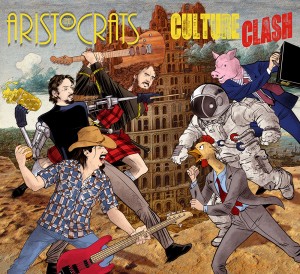Living the Dream: An Interview with Bryan Beller
 The last time we got to chat with Bryan Beller, it was several months before his freakishly good power trio The Aristocrats released their debut album. With just under two years since the band’s inception, the group has gone from an incredible lineup to a perfect storm of musical minds. Beller and cohorts drummer Marco Minneman and guitarist Guthrie Govan have spent plenty of the time criss-crossing the globe to build and strengthen their collective vision.
The last time we got to chat with Bryan Beller, it was several months before his freakishly good power trio The Aristocrats released their debut album. With just under two years since the band’s inception, the group has gone from an incredible lineup to a perfect storm of musical minds. Beller and cohorts drummer Marco Minneman and guitarist Guthrie Govan have spent plenty of the time criss-crossing the globe to build and strengthen their collective vision.
“We each have our own solo projects, and of course that informs us as we play and write,” the bassist explains, “but ultimately, the band as a whole is greater than the sum of its parts.”
The sense of connection is as evident on their latest release, Culture Clash, as it is on stage. During their sold-out tour stop at Jammin’ Java in Vienna, Virginia, the trio kept the audience electrified while pushing each other to reach new musical highs that seemed to even shock each other.
Greatness comes out of hard work, however, which is something Beller knows all about. The greatness of creating and performing art at such a high level must also be accompanied by the business savvy to promote it, which is a whole other skill set that goes hand in hand with success. Beller has been a staunch advocate for do-it-yourselfers and has honed both sides of his craft.
We reached out to him to get the scoop on the new Aristocrats album, his gear, and his advice for up-and-coming bassists.
The band sounds phenomenal. You guys first got together at a NAMM show, right?
 I had a gig at Bass Bash in Anaheim, which is one of the bass concerts at NAMM. It was going to be me, Marco Minneman and Greg Howe, but then Greg couldn’t play at the last minute.
I had a gig at Bass Bash in Anaheim, which is one of the bass concerts at NAMM. It was going to be me, Marco Minneman and Greg Howe, but then Greg couldn’t play at the last minute.
So then people started Facebook messaging me about Guthrie. I had never heard him before, so I went and looked on YouTube, and immediately I was like, “Oh my God, how have I not heard about this guy?”
So we asked him to do the gig and he said yes. We played two songs from each of our back catalogs, because we all had our own solo albums out at this point. The audience went crazy, and we decided to become a band based on the audience’s reaction.
You said there was a lot of chemistry between you three in the beginning, but at this point you’ve toured the world and recorded together. How has that changed your chemistry?
Well, it’s become tighter and stronger, I think. In the beginning, we made a record when we didn’t even really know each other that well; certainly not as well as we do now. We’re just fortunate, I guess. It turns out that we all listened to the same kind of music when we were younger and we all have a lot of the same influences. That helps with the chemistry, but there’s no substitute for just getting out on the road and playing shows. And that’s what we did.
How did your new album, Culture Clash, come about?
 Well, we all wrote individually. It’s not like we write together. So we all eventually had some time at home. Well, Guthrie and I had time at home making our demos. Marco can do it anywhere. He’s a freak. He writes while he’s on the road all the time. Guthrie and I need a little bit more seclusion in order to do it. But we all just wrote our three songs each and the record is nine songs so it’s a little democracy. We present them to the other guys and then they become Aristocrats songs once the other guys play them.
Well, we all wrote individually. It’s not like we write together. So we all eventually had some time at home. Well, Guthrie and I had time at home making our demos. Marco can do it anywhere. He’s a freak. He writes while he’s on the road all the time. Guthrie and I need a little bit more seclusion in order to do it. But we all just wrote our three songs each and the record is nine songs so it’s a little democracy. We present them to the other guys and then they become Aristocrats songs once the other guys play them.
How did you come up with the title?
“Culture Clash” is a Guthrie song. We decided to name the album that because it’s a reference to a line in a Coen Brothers film called “A Serious Man.” It’s very hard explain if you haven’t seen the movie, but there’s a scene where an asian man is talking to a jewish man in the 1950s, and the asian guy keeps saying “culture clash” over and over because they’re having a dispute about something. It just became this in-joke that we just kept saying it all throughout our European tour last summer. It’s funny how that became the name of the album, but also I’m American, Marco is German, and Guthrie is British. We constantly have these little cultural exchanges when we travel around the world. I think that informs it, too, and it certainly informs the artwork.
As far as the songs go… I wouldn’t want to put words into anybody else’s mouth but I can tell you the way that we went about this is that Guthrie really wanted to write songs that push the boundaries of what a trio could accomplish harmonically and arrangement-wise in terms of having it not sound like it’s just three guys. Especially between the guitar and the bass. It’s very intricate voicings so that sometimes it’s hard to tell what’s guitar and what’s bass. It just sounds a lot richer than most trio songs would sound. So we took great pains to do that.
Marco, as opposed to writing songs that have a million odd time signatures, he really tried to focus on groove tunes like “The Dance of the Aristocrats” and “Oh Nooo.” Even though there are odd times in there, it’s one of things where it’s all focused on the big back beat. He wanted to explore thiat concept with the band this time around as opposed to the first album which got really crazy.
As far as my songs, they’re really all over the map. I don’t know how to classify them other than I wrote some material that I’ve never written for my solo projects or explored before because I feel like this band can do anything. That’s it in a nutshell.
How do you get the sound on the “Dance of the Aristocrats?”
On the studio recording, the main synth that you hear is an SWR Mo’Bass with the bass synth effect engaged. It’s a great natural filter. It’s difficult to make work live for a variety of reasons, but in the studio it’s awesome. So I use that as the main synth but I also used the Electro-Harmonix Bass MicroSynth along with it. So it’s a combination of two synths plus a clean sound plus a little sub undertone.
How did you come up with all of that?
Marco wrote that song, and on the original demo there was a keyboard bass synth sequencer just playing that line. So it was a keyboard, but I was like, “Okay, I’m the bass player for the Aristocrats. How am I going to reproduce this?” I found a way to do it in the studio, and live I just use the MicroSynth because it’s just a more practical solution. The sound of the synth in the studio is something I’m really proud of and the Mo’Bass is really great for those kind of things. Those pedals are really hard to find, by the way.
You finished your set with the song, “Living the Dream.” What’s the back story to that one?
“Living the Dream” is a song I wrote. We travel so much, and the situation was I had just gotten back from four straight months of touring and I was jet lagged from being in Russia. I had a couple days to write my third song for the record, and no more. All I wanted to do was curl up in a fetal position and rest, but it wasn’t possible. I was frustrated and I was tired, but at the same time I’m so grateful that we get to do this. I mean, I have a wonderful job and I love my job. I love playing music and I love traveling. It’s wonderful and horrible at the same time sometimes because you’re just so physically exhausted.
I just stared at the screen basically and thought, “What the hell am I going to write? I’ve got nothing right now.” I just listened to my frustration and that song just poured out. Once I started letting it go, everything came together. It only took a couple days to get it together. I feel like that song should be dedicated to musicians who get it, you know, who understand what that is like. It’s awesome and awful to be a musician.
You’ve really embraced new media to reach fans in a new way throughout your career and finding new ways of making a living at music. What kind of advice do you have for bassists that are trying to make music your career?
That’s a very open ended question. I would first of all just say play what you love, because it will always work better that way. Obviously, you have to learn your craft, get familiar with instrument and get comfortable, but don’t run headlong into some genre [just because]. If you don’t want to play straight-up hardcore jazz because you don’t like it but you feel like you should have to learn it because you’re not cool if you don’t, well [screw] that. And if for some reason it’s the other way around and you just want to play pop music and be straight-up commercial, that’s cool, too. You don’t have to learn how to play a million notes in order to be a successful musician. Play what you love, and usually you play what you’re listening to.
Then after that, once you get your instrument and chops together, then I’d say try to show up as someone that other people are going to want to be around, and be reliable and fun. I don’t always live up to that standard, but I try. I think that when you’re going to be a freelance guy, it’s one of things where you want other people to want to call you and talk to you. And the other way to do it is if you want to be a guy that just has their own project. You’re the one doing the hiring, you’re the one doing the organizing. I kind of slip a little more easily into that role. It requires more work but I think some more of the Type A personalities might feel a bit more free when it comes to that. In that case, make your own rules. There’s no right way to do this. There’s only the way that you make up and make it work. Anything has a chance of working and the very first step of that is believing that you can make it work and starting to put in concrete steps that will make it possible – one little step at a time. Don’t think ahead five or ten years. [Think,] “What am I going to do tomorrow? What am I going to do today to get where I want to be?” And then just do that day after day after day after day. I didn’t have a successful career in music until I was 38 years old. Before that, I was working a job. I liked that job and it was fine. I learned a lot about business. It takes some people a long time to figure it out. If you want to be a musician, don’t give up.
On the hardcore business stuff, there’s no substitute for just going out there and having a real job in a corporate environment. That’s where I learned my business chops. I wouldn’t reccommend it to everybody – not everybody’s into that sort of thing. Some lessons in business are universal: there are costs, revenues, fixed expenses, varying expenses, promotional expenses. At the end of the day, there’s your brand, which is more valuable than anything. It’s who are you as a brand. Your social media posts and the way that you present yourself to the world should be consistent with the brand that you’re trying to produce. I always ask people, “Can you describe what you do in ten words?” If you can’t, you haven’t thought about it for long enough. That’s a difficult exercise for someone who’s not comfortable selling themselves. It’s not like when you come up with those ten words you need to go post them everywhere. That’s not the idea. The idea is just to think in your own head, “What is it that I do? What is it that I’m trying to project? What is it that I’m trying to sell?” If you want to be that guy – if you want to be the person who is up on social media trying to make a brand for yourself or at least a product and wanting to get hired by certain things. It’s worth it to figure out what it is that you want in your own head first, what it is that you want to project to other people, and then let those ten words inform your actions.
You’ve self-published a lot of your work, which kind of goes into what you were just talking about. What do you think of the differences between going independent and using a major label?
Why would anybody sign a record deal these days? The only reason record deals ever existed was because of the expenses. The cost of making a record used to be so incredibly high. Studios cost so much money, and it used to be very difficult for anybody to afford to make their own record. So what you would do is you go to someone with money, like a record company. They would give you the money to make the record in exchange for everything. They would own the record or have such a bad royalty deal that you would make a dollar or two off of every record, just because you come up with the money to make it in the first place. Well, it only costs 10, 20, or maybe 25,000 dollars to make a record these days. And I know I’m saying “only,” but it really is in the grand scheme of things. “Only.” I really mean that. There are so many ways to raise that money. It’s not much in the grand scheme of things. So don’t give away your record. Don’t sell your record to a record company just because you don’t have the cash to do it. Find the cash. Raise it from your family, your friends, do a Kickstarter, whatever. Anything, just don’t sign a record deal! Keep your own material. The tools are all there. The internet makes it possible for you to create and modern studio equipment makes it possible for you to make a great sounding record for not that much money and own it and release it. Then, find out how much you sell. Take those results and analyze them and make the next record.
That number seems scary to so many people, but so many people spend so much money over the course of their lives on so many trivial things. People don’t realize how little that money really is.
Are you still actively working on doing house concerts?
My wife, Kira Smalls, and I have done a lot of house concerts over the last couple of years. She’s a singer-songwriter and in a way, the competition is more intense for her because there are so many people out there doing that thing. You’ll never make any money, especially touring with a band doing that thing. The truth is that now I’m completely booked until the end of the year between The Aristocrats and Joe Satriani. So I don’t have as much time to do the house concert thing as I used to, but Kira and I did one earlier this year and we had a great time. We went back and forth across the country. For anyone that’s looking for a really affordable way to tour – especially if they have an act that will work in someone’s living room – it’s just a really, really great way to do it.
Can you give us a rundown of your touring gear?
My main head is a Gallien-Krueger Fusion 550. I use that as my main head and my power amp into one Gallien-Krueger 4×12 and then I run an audio out to a Gallien-Krueger 2001RB as a power amp and I run that to another 4×12. It’s a lot of headroom and a lot of cabinets but it’s a great rig.
The pedalboard goes like this: volume pedal and a tuner, Boss OC-2 Octave, and Xotic Effect BB3 amp as my first overdrive, the Digitech Bass Driver as my second overdrive, the MXR M80 as my third overdrive, and the Darkglass Electronics Vintage Microtubes as my fourth overdrive. So I use them all for different things and they all get used on specific songs where those specific songs are being used. I use an Aphex Bass Exciter to go along with the Darkglass Electronics Vintage to add a little active EQ to it, then I use a Dunlop bass wah along with the overdrive to get my overdriven wah sound. You always want to overdrive a wah when you’re a bass player, or else it won’t cut at all. Then I have an Electro-Harmonix Bass MicroSynth and I have an Retro-Sonic Chorus, which is a great chorus. I have a Boss DD-3 digital delay, a TC Electronic FlashBack delay for a different setting, a TC Electronic Hall of Fame Reverb, an MXR M87 compressor, which I just use for one song where I have to get crazy harmonics with the Aristocrats. Then an Xotic Effects EP Booster, which I use to balance out my passive bass with my active bass, which are both my goals. Finally I have a Demeter Opto-Compulator which I use as a compressor at the end of the board [and I keep] on all of the time.
What’s next for you?
We’re going to do this tour all the way through the end of August. We’re going to hit all of the Northeast and the Midwest, then we’re going to work our way down the Prairie and into Texas. Once that’s over, Marco and I go off to play with Joe Satriani for a U.S. tour starting in San Diego. So we just work our way back for the next eight weeks and Guthrie goes off to do clinics around the world and also to work with Steven Wilson.
I’m grateful to be so busy. I remember when I wasn’t so busy, and you just gotta have faith that it’s somehow going to work out and keep putting it out there that you want to do this for a living. Hopefully when the opportunity comes, you’ll be ready for it.
For more, check out Bryan’s website at bryanbeller.com.
Photos by Rob Olewinski, Jennifer Young and Frank Teger




apart from his music what I am starting to like most about Brian Beller. He doesn’t make me as a simple beginner feel like I can’t even begin to aspire to play what he plays. Not that I think I will ever get there, but he gives some good level headed advice to all level of players. You think you might make at least part of the way there. Which is a good sort of inspiration. It is sometimes indeed a bit awful if you think of all the things you can NOT play. So a bit of encouragement is really appreciated.